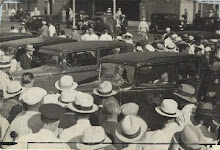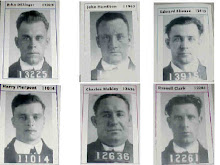Crimes in the 1930s likely went 2 ways; consensual or violent.
Consensual Crimes were no doubt violent but they were crimes primarily in the sense of criminal organizations running illegal enterprises; such as prostitution, gambling, racketeering, or selling of illegal goods. "...the only complainants are the law enforcers themselves; so long as the crime goes undetected, there is no 'victim' in the legal sense of the word, only customers"(Helmer & Mattix).
Violent Crimes is, simply put, robbery or kidnapping. Crimes that go noticed by law enforcement and cause those guilty to either run and rob another day or stay and face the legal, and often times in the 1930s, lethal retributions from The Law.
***Think Al Capone and John Gotti VS. Jesse James and John Dillinger.***
Now the question is where did IT all begin? Well, I'm of the mind that as long as Human Beings live together and are capable of Human Thought then their will always be crime. That said, maybe the question is; Why have the 1930s echoed so deep within me? It's the the grand scale of it all. Al Capone was imprisoned in 1931 leaving Frank Nitti running Chicago (with plenty of hits taken to claim the throne), Alvin Karpis as the violent crime mastermind, Dillinger escaping twice from Prison and helping his Boys do an escape of their own, Verne Miller and two others had their Kansas City Massacre, and all the while civilians had to be scared. But, given the crushing Depression, there must have been a subtle sense of empathy or even ujst envy for these crooks. The "Big Man" was getting by just fine while the regular working man was scrounging for his family's next meal. Who wouldn't want a Bank hit or a rich fella ransomed? As for 'The Syndicate' of crime bosses, 'fences', enforcers, bootleggers, and such; I have no doubt that the good people walking the streets of New York, St Paul, and Chicago were afraid of them but none-the-less intrigued.
Finally, for my first blog, I think it important to discuss the limitations of Law Enforcement in 1930 that allowed Crime to flourish. There was no FBI, at least not yet. There were no fax machines, cell phones, computers, or central finger print or wrap-shett databases. Communication between different law enforcement agencies and states was horrendous. Remember, this is after a time in the 19th century when in the west was slowly unifying with the United States as Rangers and Pinkertons were the nations law enforcers. By 1930 organized crime was booming from their power in Prohibition, among other things, and steaming with arsenals full of Guns, tons of cash, and lines long with people looking to earn a buck- any way possible. Some would join the Syndicate and some would go another way. In either case they worked in unison and, often times, together. How do you catch Crooks hidden in a tightly teathered and enormous Network? Especially when those in your own network are not working together on all cylinders. It would take Violence at an overwhelming amount to thrust the nation into the War on Crime. It would a massacres to you're own- not crooks as in the case of the St. Valentine's Day Massacre- to unify Lawmen against the Wild Ones. *I hold this last statement with much credit to Bryan Burrough who's "Public Enemies" is by far the best chronicling of this time- his focus being 1933-34. No worries; I plan not only a Review of The Book, but also a Post on the upcoming Film adaptation by Michael Mann starring Johnny Depp and Christian Bale (that's just the two top roles.
http://www.imdb.com/title/tt1152836/)
In 1934, imagine if you were a G-Man (FBI Agent) that just saw Baby Face Nelson drive by you. You tail him as best you can- likely with a fellow agent at your side- and you follow him to his hideout- to where Dillinger, Homer Van Meter, John Hamilton, and Tommy Carroll lay waiting. Do you stay and shoot it out- suicide- or leave, find a phone, and debrief your Superior. You call your superior and after a couple hours return to the hideout 20 agents deep. But you're too late and the Gang has fled.(just an example- nothing happen exactly like this-though they did have their run-ins)
This, along with overwhelming "leads" to follow up on with limited man Power and "Rookie" mistakes aplenty, leaves the Boys and the Syndicate holding a stacked deck; they had the experience, the man-power, the funds, and the guns to do as they willed. To take what they want by any means they deemed necessary. Like Dillinger said, "We can't all be saints"(Girardin).









